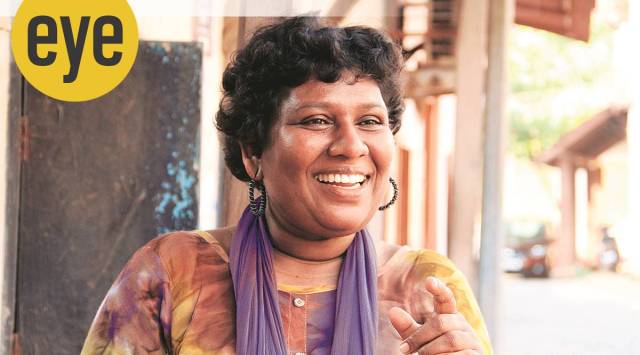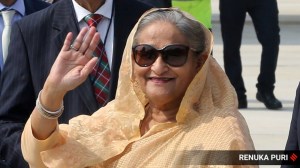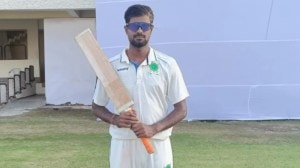What hasn’t changed for Bindu Ammini, the woman who entered the Sabarimala shrine
The story of Ammini, a teacher and Dalit activist, on the fourth anniversary of her entry into the temple, as she continues to be ostracised
 Bindu Ammini
Bindu Ammini It’s not easy being Bindu Ammini. The Dalit activist and teacher was one of the first two women to enter the Sabarimala hill shrine in Kerala, following the Supreme Court verdict of September 2018 that allowed entry to women of menstruating age, for the first time.
Four years later, social exclusion continues to be the biggest obstacle for Ammini. “Of the 3.5 crore people in Kerala, not even 50 have opposed me in person. But the few who have objected, give the impression they are a majority. I’m facing this boycott due to their influence,” says the 44-year-old.
Since her teenage years, Ammini has been working for social causes as part of the National Service Scheme. “In college, I was president of the women’s wing of CPI-ML (Communist Party of India (Marxist–Leninist) Liberation) students’ union, and later a central committee member. By 2010 , I dissociated myself from political organisations and started focusing on my career,” she says.
With a Masters in Law, which she completed in 2013, she began teaching at the Government Law College Kozhikode. It’s her faith in the Constitution, she says, that has helped her stand her ground in the face of a sustained hate campaign. “Today, I teach the Constitution. How can anyone with self-esteem sit back and watch when women are targeted over the (Sabarimala) issue,” she says.
On January 2, 2019, Ammini and Kanakadurga, 43, who was then employed as the manager of an outlet of the Kerala State Civil Supplies Corporation in neighbouring Malappuram district, entered the Sabarimala temple under heavy police protection.
“I’ve often been asked if I am a devotee. It is their way of questioning my decision to go to Sabarimala. How do you assess one’s devotion? Has this question ever been asked of any man? Social reformers who fought for change against religious exclusions were never devout or religious,” says Ammini, who has been subjected to several physical assaults.
On January 5, last year, Ammini had a head injury when a man assaulted her on a main road in Kozhikode. “I’ve only become stronger with every attack. We need to be mentally strong,” says an undeterred Ammini, “I face threats all the time, but I have never regretted my decision nor do I fear anyone.” But there are moments when she feels powerless, “especially when my students are bullied for supporting me.”
She recalls a day when she was at her daughter’s school. The children taunted her with “Swamiye Sharanamaiyappa”, a chant of the Sabarimala pilgrims. Did that worry her — the extent to which children had been influenced? “No, children can be brainwashed and misled at a young age but they will emerge braver and form informed opinions once they grow up. There are several youngsters who think differently. So there’s no need to worry about them,” she says.
She reveals that some friends, too, are reluctant to be seen in public with her. “I’ve got used to it. I have no regrets. It is not my problem.”
The fight came closer home when Ammini’s partner Hariharan KV and daughter Olga BH had to stay away from home, soon after she defied the ban. Olga, a Class 11 student, takes her name from Olga Benário Prestes, the German-Brazilian communist who was executed by Nazi Germany. Ammini’s mother, who faced threats, had a cardiac arrest and had to be hospitalised.
While she blames “right-wing forces” for the attacks on her, Ammini is as disappointed with the response of the CPI (M)-led Left Democratic Front government in Kerala. The “callousness” of the government, she says, has made her consider moving out of Kerala or seeking asylum elsewhere.
“After the Supreme Court order, the Chief Minister (Pinarayi Vijayan) had assured that women visiting the shrine would be safe. Even now, those who attacked me are not arrested. The least they can do is protect me,” she says.
“If I move out, it won’t be because I am scared or afraid of the Sangh Parivar. It will be as a mark of protest against the government in Kerala where Adivasis and Dalits are not safe. I will shift to a place where I can continue my work and activism. Here, I can’t do anything,” says Ammini. She had to stay away from programmes she was invited to, because of the government’s stance. “The attitude of the Left government reflects that of the Sangh Parivar,” she says.
On March 8, last year, Ammini launched “She Point” at Kaniyambetta in Wayanad district, where she bought land that fit her budget. Here, working women who have nowhere to go can stay on a temporary basis. It currently has a library and is a work in progress.





- 01
- 02
- 03
- 04
- 05


























